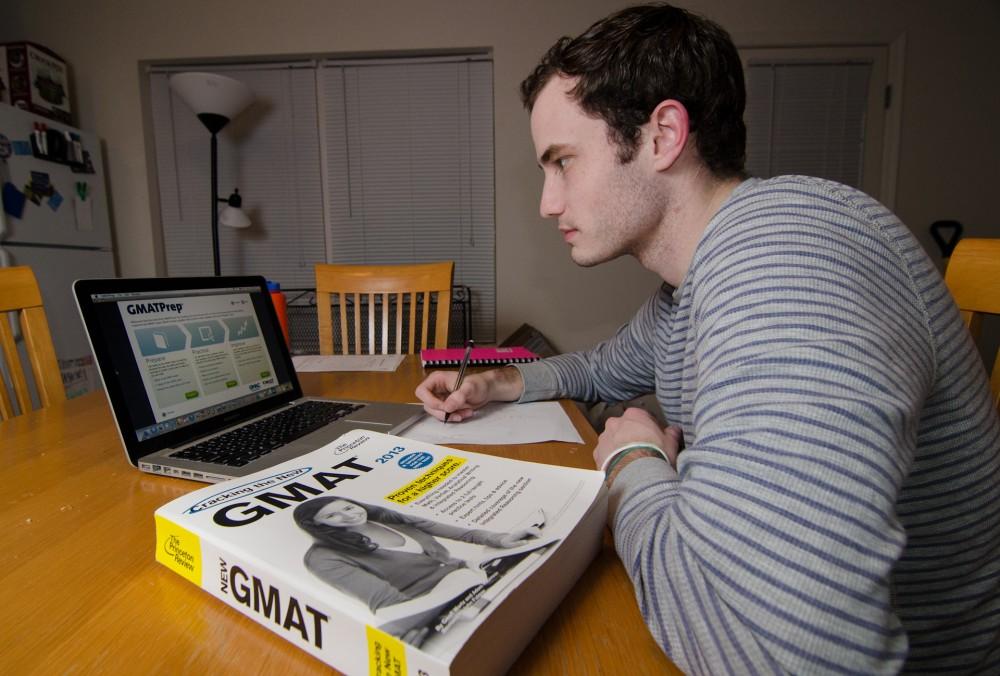GVSU offers workshops on preparing for graduate, professional school exams

GVL/Jessica Hollenbeck Senior Andrew Wellman prepares for the GMAT. Wellman is a double major in Accounting and Management
Feb 14, 2013
As many students start to register for exams for both graduate and pre-professional schools, Grand Valley State University offers a few resources that can assist in preparation.
JoAnn Litton, senior academic adviser for pre-professional programs at GVSU, said there is currently a workshop that meets every Thursday and ends Feb. 21 to help students prepare for taking exams for different pre-professional schools. These workshops cost $40 in total and focus on students looking to attend dental, medical, optometry or pharmacy school post-graduation.
Litton said each week at the workshop, the course focuses on one part of the entrance exam, such as physics, general chemistry, organic chemistry, biology and verbal reasoning. She added that students don’t necessarily have to attend all the courses, especially if one of the subjects isn’t required in their examination, but students are highly encouraged to attend all relevant courses to their exams.
“In this Thursday’s workshop, we will go over the Prometrics system that the students will be using when taking their real examination,” Litton said. “We talk about the fingerprints and federal ID required, as well as the checking-in process.”
She said within the workshops, they not only go over practice questions, but also do hands-on type activities as well. For the dental students, their examination requires students to have perceptual ability. Stacking up cubes in 3D and seeing which items fit in a keyhole are a few sessions that help students getting ready to take a dental exam.
While attending these workshops can be a good review and refresher, Litton said students must also have taken the appropriate course work within the curriculum before attending them and signing up for examinations.
“Do not take an exam before you’ve had a prep course, because the scores go with you,” Litton said. “Take your courses in the appropriate sequence; that is the best prep to take any exam. Also keep in mind that getting into professional schools isn’t just about test scores—schools also look at applicants holistically.”
She added students can sign up for the free Kaplan’s question of the day sessions online for additional practice with possible exam questions.
Claudia Bajema, director of the graduate business program at GVSU, said her office offers a free preparatory course three times a year for students seeking to take the Graduate Management Admission Test. These courses are offered in June, February and October.
Bajema said the courses are for two Saturdays, where on one day the instructor goes over verbal review and the next Saturday is more quantitative based.
“The workshops for the GMAT are largely focused on test strategies and techniques, as well as some review of the GMAT content,” she said. “It’s a very informal presentation with Q-and-A.”
Mark Luttenton, biology professor and chairperson of the graduate council, said in the past the graduate council has used standardized tests that are available through test services, and they use the Graduate Record Examination to measure whether the curriculum is doing a good job preparing nationally. He added there are other factors, however, in determining whether an individual is ready for graduate school.
“There are so many subtitles to the GRE and preparing for it,” Luttenton said. “As far as I can tell, there’s an individual aspect, where some students do well on standardized tests, and others don’t do so well. There are some undergraduates that don’t perform well on the GRE, but we know from previous academic work that they have the tenacity and determination to be successful in grad school and professional in the school.”
When preparing for the GRE, Luttenton suggested that students should simply read questions on sample exams and use any strategies that the GRE or Kaplan programs recommend to improve scores. In addition, he said it’s important to know the content well from taking previous courses.
“For biology, the GRE largely consists of verbal reasoning and analytical skills,” Luttenton said. “That’s stuff that hopefully a student going on to grad school has developed over the course of their academic careers.”
For further information on the workshops offered for pre-professional schools and the GMAT, call 616-331-8585 . For information on the GMAT, email [email protected].
[email protected]






















